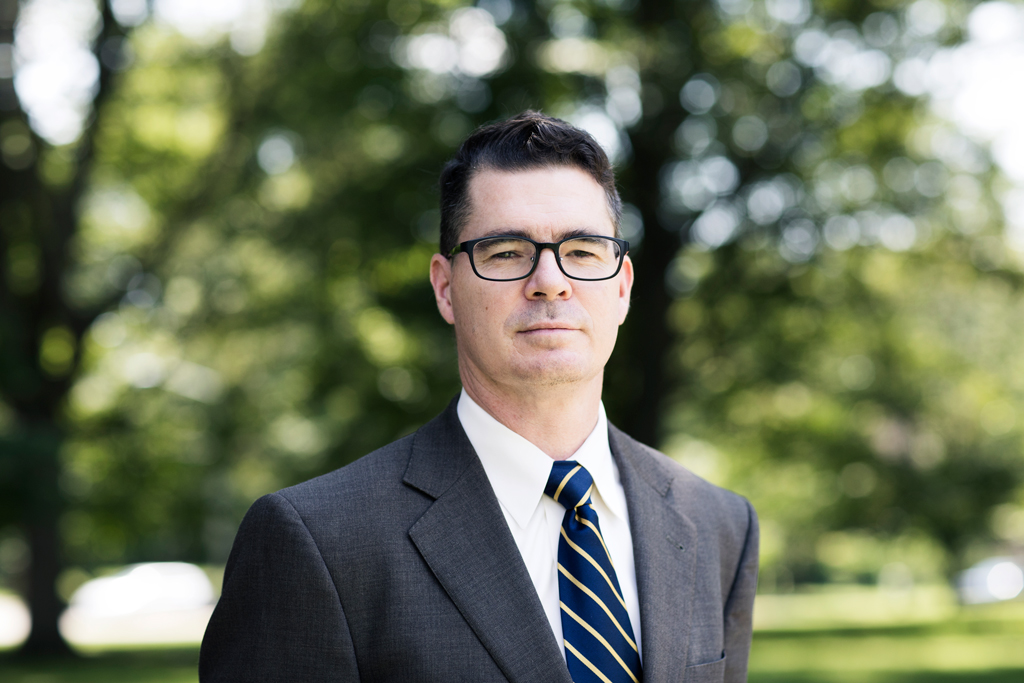One of John D. Wilsey’s favorite hobbies is to go out into the woods with nothing but a compass and a map, and find his way to a destination with no trail. Sometimes he goes at night, sometimes during the day. It’s called “orienteering,” and he’s been doing it for years.
But one thing he especially loves is inviting students to navigate the woods with him.

“I’ve always taken students out to the woods to teach them how to use maps and compasses. Because in the learning of the maps and the compasses, you learn how to trust your compass,” he said. “Even when you don’t feel like your compass is leading you the right way, if you are diligent to follow the direction the compass is pointing you, even if you don’t feel it, you see that it is right. There’s a lot of spiritual application in that. The Scriptures are a lot like a compass.”
Wilsey, new associate professor of church history at Southern Seminary, wants his students to have a deep appreciation for the sufficiency of Scripture. That’s something he teaches both inside and outside his classroom.
He specializes in the history of ideas in the Christian West, especially the history of Christian nationalism, religious freedom, and the interaction of church and state in America since the colonial period.
As Americans, he said, “an awareness of our national history helps us to appreciate the liberties that we have, to be vigilant to protect those liberties and advance them, and to extend them where appropriate.”
Wilsey is the author of two books, American Exceptionalism and Civil Religion: Reassessing the History of an Idea and One Nation Under God: An Evangelical Critique of Christian America. He is also the editor of an abridged edition of Alexis de Tocqueville’s classic work Democracy in America.
On a practical level, he thinks an understanding of history is crucial because history has “relevance on who you are today,” whether it be on one’s personal history, national history, or the history of Christianity.
He thinks that Christian history is even more foundational, because without some understanding of Christian history, one cannot even begin to understand and believe the gospel.
“Christianity is an historical faith. We believe in a risen Christ who was crucified by human beings in a real place with real nails and a real cross in space and in time,” he said. “We look back in history to see the meaning and message of the gospel. It’s fulfilled in Christ and is lived out in the experience of Christians who have gone on before us.
“History is absolutely indispensable for us as a church, for us as Americans, and for us as individuals.” His love for history and Scripture complements his passion for educating young people. His entire career has been spent investing in students.
Wilsey, who did not grow up in a Christian home, was converted as a freshman at Furman University. Right after receiving his bachelor’s degree in history, he became a Christian school teacher and a principal at the same school.
Even while attending Southeastern Seminary, where he met his wife, he taught school. His love for students carried over into his ministry as well, where he served as a youth pastor at First Baptist Church of Charlottesville, Virginia, before and during his time working on his doctorate of philosophy.
He took this passion for education with him to the seminary level when, in 2011, he started teaching at Southwestern Seminary. And in the fall of 2017, he began two new academic adventures.
He became an associate professor of church history at Southern and a fellow at Princeton University, where he is taking an academic year to research and write a religious biography of John Foster Dulles, President Dwight D. Eisenhower’s secretary of state, for whom Washington D.C.’s Dulles International Airport is named.
Recently, he taught a few Southern J-term courses while living at Princeton. In the summer of 2018, he’ll return to Southern as full-time residential faculty.
“I’m pinching myself for both getting to teach at Southern full-time and getting to be at Princeton,” he said. “I’m pretty sure that somebody made a clerical error and somebody else was supposed to get these two wonderful opportunities. So far they haven’t discovered their mistake and I’m the beneficiary.”




